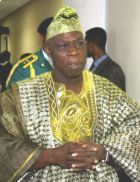Obasanjo calls for quick action at Darfur talks
ABUJA/KHARTOUM, Aug 23, 2004 (dpa) — Talks between the Sudanese government and two rebel groups from the western Darfur region began Monday in the Nigerian capital Abuja, as the British Foreign Secretary Jack Straw travelled to Sudan for talks with the government in Khartoum.
 The talks take place a week before the United Nations is to review progress made by the Sudanese government in disarming the Janjaweed militia – held responsible for atrocities in Darfur – and in improving the humanitarian situation there.
The talks take place a week before the United Nations is to review progress made by the Sudanese government in disarming the Janjaweed militia – held responsible for atrocities in Darfur – and in improving the humanitarian situation there.
“We need to act quickly. Let us bear in mind the suffering of refugees and displaced persons, dislocations caused by attacks and counterattacks by militia groups”, Nigerian president Olusegun Obasanjo, current chair of the African Union (A.U.), said at the opening of the talks.
“As far as we are concerned in Africa, part of our house is on fire. It is an irresponsible neighbour that can fold his arms and do nothing, but we must do something because we are brothers” he added.
In his remarks, the head of the A.U. Commission, Alpha Oumar Konare, said that “the rule of law must be entrenched in Darfur”.
He also said the A.U. did not believe in a military solution or an “external intervention” in Darfur.
“Nobody should try to divert the peace process. There is need to nurture peace with patience. Africa has the confidence that a solution acceptable to all sides in the Sudanese crisis could be obtained within the continent,” said Konare.
Previous talks between Khartoum and the rebels collapsed in July after the rebels walked out, saying the government had not met their demands.
The Sudanese delegation to Abuja was headed by Minister of Agriculture Majzoub al-Khalifa, who also led Khartoum’s delegation to previous talks.
The two rebel groups were headed by their top negotiators. The Sudan Liberation Army (SLA) delegation was headed by its chairman Abdulwaheed al-Nur, and the Justice and Equality Movement (JEM) delegation was led by its executive council member Ahmed Togot.
After opening speeches, talks between the delegations began behind closed doors.
The exact agenda of the talks have not been made public. Before leaving Khartoum, Khalifa told reporters that the talks would focus on “security, humanitarian and political issues”.
Sudanese government officials said that “the government is taking this round of talks very serious and the delegation to the talks is fully mandated to reach a settlement to the crisis in the western region”, according to the pro-government Sudanese Media Centre.
Nigerian President Obasanjo said on the eve of the talks that Khartoum should do more to disarm the Janjaweed militias.
The conflict in Darfur, which has lasted for 18 months, started when two rebels groups, the Sudan Liberation Army (SLA) and the Justice and Equality Movement (JEM) rose up against the government in Khartoum, saying they were not being given a fair share of the country,s resources.
The government then allegedly unleashed the Arab Janjaweed militia, arming them and giving them air support. The militias have since, according to reports from aid and human rights organizations, raped and killed thousands of civilians in Darfur.
Around 50,000 people are believed to have died as a result of the conflict, either violently and of starvation or disease. More than a million people have fled their homes, and two million are in urgent need of food and medical attention.
As the August 30 U.N. deadline for disarming the militias and improving the humanitarian situation in Darfur nears, Khartoum has said the situation is improving as they are deploying thousands of police to Darfur and creating safe areas for displaced people.
Reports from the U.N. and other organizations speak of a different reality, however, describing a new wave of violence in Darfur in recent weeks.
The European Union representative to the talks, Swedish diplomat Sten Rylander said over the weekend that he could not see “any task more vital for the African Union than resolving the Sudan crisis”.
Expressing confidence in the A.U. mediating team headed by former Niger premier Hamid Algabid, Rylander said “initially the main thing is to get talks going and listen to the parties”.
“The art of listening is the key in all mediation. You then have to start from the positions the parties present to find constructive solutions,” Rylander added.
A top priority is to solve the humanitarian crisis “so that it doesn’t degenerate further” and maintain pressure on the parties, the Swedish diplomat said.
Meanwhile, Britain was set to issue a strong warning to the Sudanese government over the humanitarian crisis in Darfur as Foreign Secretary Jack Straw flew to Khartoum for talks before heading for the crisis region.
Straw, due to land in Khartoum late Monday night, was meeting Sudanese Vice-President Ali Osman Mohamed Taha and Foreign Minister Mustafa Osman Ismail in Khartoum before visiting the Abu Shouk refugee camp in northern Darfur Tuesday.
Further talks in Khartoum are scheduled thereafter with Sudanese President Omar al-Bashir and U.N. special representative Jan Pronk.
British Foreign Office officials made clear Straw would insist Sudan do more to help the victims of the Darfur conflict, characterized by the U.N. as the worst humanitarian crisis in the world. The U.S. Congress has passed a resolution to the effect that genocide is taking place.
British officials termed the dialogue with Sudan as “strong and frank”.
British officials queried the intentions of the government. “Are the government of Sudan doing enough? No. It is quite clear they are not doing enough to deliver on their commitments,” a foreign office official told journalists ahead of Straw,s departure.
